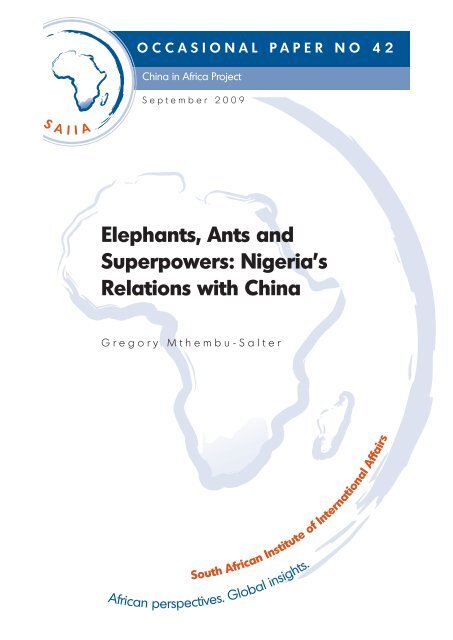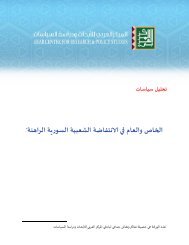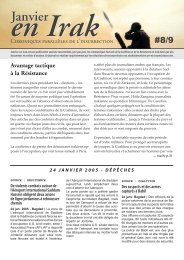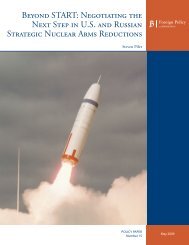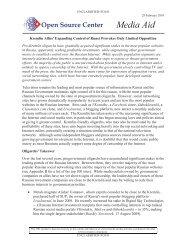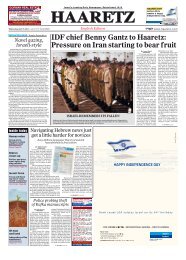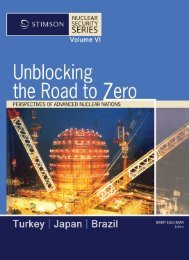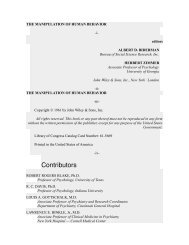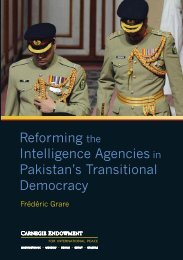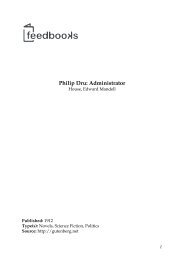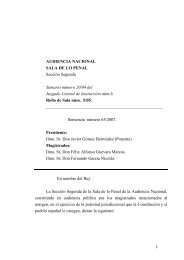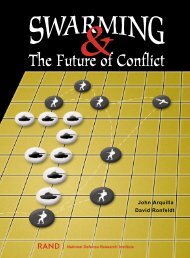Elephants, Ants and Superpowers: Nigeria's Relations with China
Elephants, Ants and Superpowers: Nigeria's Relations with China
Elephants, Ants and Superpowers: Nigeria's Relations with China
Create successful ePaper yourself
Turn your PDF publications into a flip-book with our unique Google optimized e-Paper software.
OCCASIONAL PAPER NO 42<strong>China</strong> in Africa ProjectSeptember 2009<strong>Elephants</strong>, <strong>Ants</strong> <strong>and</strong><strong>Superpowers</strong>: Nigeria’s<strong>Relations</strong> <strong>with</strong> <strong>China</strong>Gregory Mthembu-SalterSouth African Institute of International AffairsAfrican perspectives. Global insights.
ABOUT SAIIAThe South African Institute of International Affairs (SAIIA) has a long <strong>and</strong> proud recordas South Africa’s premier research institute on international issues. It is an independent,non-government think-tank whose key strategic objectives are to make effective input intopublic policy, <strong>and</strong> to encourage wider <strong>and</strong> more informed debate on international affairs<strong>with</strong> particular emphasis on African issues <strong>and</strong> concerns. It is both a centre for researchexcellence <strong>and</strong> a home for stimulating public engagement. SAIIA’s occasional paperspresent topical, incisive analyses, offering a variety of perspectives on key policy issues inAfrica <strong>and</strong> beyond. Core public policy research themes covered by SAIIA include goodgovernance <strong>and</strong> democracy; economic policy-making; international security <strong>and</strong> peace;<strong>and</strong> new global challenges such as food security, global governance reform <strong>and</strong> theenvironment. Please consult our website www.saiia.org.za for further information aboutSAIIA’s work.ABOUT THE CHINA IN AFRICA PROJECTSAIIA’s ‘<strong>China</strong> in Africa’ research project investigates the emerging relationship between<strong>China</strong> <strong>and</strong> Africa; analyses <strong>China</strong>’s trade <strong>and</strong> foreign policy towards the continent; <strong>and</strong>studies the implications of this strategic co-operation in the political, military, economic <strong>and</strong>diplomatic fields.The project seeks to develop an underst<strong>and</strong>ing of the motives, rationale <strong>and</strong> institutionalstructures guiding <strong>China</strong>’s Africa policy, <strong>and</strong> to study <strong>China</strong>’s growing power <strong>and</strong> influenceso that they will help rather than hinder development in Africa. It further aims to assist Africanpolicymakers to recognise the opportunities presented by the Chinese commitment to thecontinent, <strong>and</strong> presents a platform for broad discussion about how to facilitate closerco-operation. The key objective is to produce policy-relevant research that will allow Africato reap the benefits of interaction <strong>with</strong> <strong>China</strong>, so that a collective <strong>and</strong> integrated Africanresponse to future challenges can be devised that provides for constructive engagement<strong>with</strong> Chinese partners.A ‘<strong>China</strong>–Africa Toolkit’ is being developed to serve African policymakers as aninformation database, a source of capacity building <strong>and</strong> a guide to policy formulation.Project leader <strong>and</strong> series editor: Dr Chris Alden, email: J.C.Alden@lse.ac.ukSAIIA gratefully acknowledges the generous support of the main funders of the project:The United Kingdom Department for International Development (DfID) <strong>and</strong> the SwedishInternational Development Agency (SIDA).© SAIIA September 2009All rights are reserved. No part of this publication may be reproduced or utilised in any from by anymeans, electronic or mechanical, including photocopying <strong>and</strong> recording, or by any information orstorage <strong>and</strong> retrieval system, <strong>with</strong>out permission in writing from the publisher. Opinions expressed arethe responsibility of the individual authors <strong>and</strong> not of SAIIA.
CHINA IN AFRICA PROJECTINTRODUCTION‘Nigeria <strong>and</strong> <strong>China</strong>: A tale of two giants.’Alaba Ogunsanwo, 2007 1‘Third World countries [will] surely unite <strong>with</strong> <strong>and</strong> st<strong>and</strong> behind <strong>China</strong> like numerous “ants”keeping the “elephant” from harm’s way.’<strong>China</strong>frica, 1990 2The relationship between two countries as paradoxical <strong>and</strong> complex as Nigeria <strong>and</strong><strong>China</strong> was never going to be straightforward. But is this relationship at heart a taleof two giants, as Alaba Ogunsanwo, the distinguished Nigerian academic <strong>and</strong> formerdiplomat, would have it, or, rather, employing the phrase of the Chinese periodical<strong>China</strong>frica, a more parochial story of a global ‘elephant’ <strong>and</strong> just one of many Third World‘ants’? The two tales converge concerning <strong>China</strong>’s status, which both views correctlycharacterise as weighty, but diverge on Nigeria’s. Which is correct?On one level, Nigeria has a good claim to African superpower status. There are estimatedto be 138 million Nigerians, out of an African total of around 781 million, meaning that17.7% of the continent’s population is Nigerian. 3 Africa’s next most populous country,Egypt, has just 84 million people, 60% of the Nigerian total. Nigeria’s annual gross domesticproduct (GDP) in 2008 was estimated at $216 billion, the fourth highest in Africa afterSouth Africa, Egypt <strong>and</strong> Algeria. 4 Nigeria’s exports were worth an estimated $65.5 billion in2007, 5 again far higher then for most countries on the continent. Roughly 95% of Nigerianexport earnings come from oil, 6 <strong>and</strong> the country produces 1.8–2.3 million barrels per day(b/d), depending on the level of insecurity in the Niger Delta, 7 similar to Iraq’s currentproduction levels. Nigeria’s nearest African competitor in oil exports, Angola, producedan average of 1.9 million b/d in 2008. 8 Nigerian oil reserves are estimated at 32–36 billionbarrels, <strong>and</strong> in addition the country is among the most richly endowed on the planet interms of natural gas, <strong>with</strong> an estimated 100–188 million cubic feet of reserves. 9Then there is Nigeria’s historically prominent role in continental politics, through theUnited Nations (UN), the Economic Community of West African States, the African Union,<strong>and</strong> the latter’s supposed economic blueprint, the New Economic Partnership for Africa’sDevelopment. Over the years, Nigeria has, in true superpower style, often deployed troopselsewhere in West Africa to restore order, most notably in Liberia, <strong>and</strong> is also competing<strong>with</strong> South Africa to win a possible permanent seat on a reformed <strong>and</strong> exp<strong>and</strong>ed UNSecurity Council.Yet there is also a strong case to be made for Nigeria’s ‘ant’ status. The country’s GDPper capita was just $792 in 2009, putting the country in the bottom half of the ratingsof the countries of Africa, the world’s poorest continent, well below the continent’sother oil producers, <strong>and</strong> also lower than economic minnows such as Zambia <strong>and</strong>Côte d’Ivoire. 10 Life expectancy is just 47 years, 11 <strong>and</strong> the under-five mortality rate in 2005was an appalling 194 per 1 000 live births. Despite billions of dollars in oil revenues overthe years, less than half the population has access to drinking water or sanitation, <strong>and</strong> thecountry’s Human Development Index ranking in 2008 was a dismal 154 th in the world. 12The mismatch between the country’s earnings <strong>and</strong> its human development status pointsto Nigeria’s long-st<strong>and</strong>ing governance problems. Nigeria had its first coup d’état in 1966,SAIIA OCCASIONAL PAPER NUMBER 424
CHINA IN AFRICA PROJECTAfter two years of studied silence on the matter, in September 1968 the Chinesegovernment publicly backed the bid by Nigeria’s Ibo-dominated Biafra region to secedefrom the federation. A statement by Chinese Foreign Minister Chen Yi at the time linkedthis support to the Soviet Union’s backing of the Nigerian government on the issue, thoughanother factor appears to have been the support given to Biafra’s cause by <strong>China</strong>’s key allyin Africa at the time, Tanzania. <strong>China</strong> covertly supplied the Biafran administration <strong>with</strong>small quantities of light arms, souring <strong>China</strong>’s relations <strong>with</strong> the Nigerian government,but making no discernible difference to the outcome of the war, which ended <strong>with</strong> Biafra’scollapse in January 1970. 20Formal diplomatic ties were established only in 1971, when Nigeria was in the fifthyear of rule by its second military dictator, General Yakubu Gowon, <strong>and</strong> <strong>China</strong>, 22 yearsafter first applying, finally obtained admission to the UN. 21 Gowon visited <strong>China</strong> inSeptember 1974, the first Nigerian head of state to do so, but to little consequence, sincehe was ousted from power ten months later by Brigadier (late General) Murtala RamatMuhammed. Muhammed was assassinated in 1976, <strong>and</strong> Olusegun Obasanjo, then thearmed forces chief of staff, took over as head of state. Obasanjo became worried at thegrowing trade imbalance between the two countries as Chinese manufacturing <strong>and</strong> exportcapacity increased <strong>and</strong> high-level delegations travelled between the two countries in bothdirections to discuss the matter in 1978 <strong>and</strong> 1979. The visits resulted in <strong>China</strong> agreeingto a limited aid package for Nigeria, including the sending of medical personnel <strong>and</strong>agricultural experts to assist in the development of new model farms but this did nothingto reverse the trade imbalance. 22 At the same time, the Nigerian government, like thatof most other African countries, strongly disputed the line that the Chinese governmenttook during this period over the Angola conflict. Despite its long-held rhetorical supportfor ‘anti-imperialist struggles’, the Chinese government had, to the outrage of many otherAfrican governments, opposed Cuba’s intervention on the side of the Angolan governmentbecause of <strong>China</strong>’s support for a rival group, also backed by the US, the Frente Nacionalde Libertação de Angola. As <strong>with</strong> Biafra, <strong>China</strong>’s position appeared solely due to its intenserivalry <strong>with</strong> Cuba’s superpower backer at that time, the Soviet Union. 23The 1980s <strong>and</strong> 1990s were a difficult time for Nigeria. Obasanjo left power in 1979,<strong>and</strong> Shehu Shagari won the ensuing election <strong>and</strong> became president, lasting until 1983,when he was deposed by Major-General Muhammadu Buhari. Buhari ruled for two yearsuntil he too was toppled, this time by Major-General Ibrahim Babangida. Babangida heldpower until 1993, when, following a disputed election, defence minister Sani Abachaseized power. Abacha proved to be the most brutal <strong>and</strong> inept of the country’s militaryrulers, presiding over both intensifying economic collapse <strong>and</strong> ever-worsening statethuggery, <strong>and</strong> there was an unmistakeable sense of relief when it was learned in June 1998that he had died, apparently of a heart attack, while in the company of two prostitutes. 24Abacha initiated contact <strong>with</strong> the Chinese government early in his rule. The Nigerian–Chinese Chamber of Commerce was founded in 1994, 25 the <strong>China</strong> Civil EngineeringConstruction Corporation (CCECC) won a $529 million contract to rehabilitate theNigerian railway system in 1995 26 (<strong>with</strong> Abacha’s children allegedly in on the deal 27 ),<strong>and</strong> the former premier of <strong>China</strong>’s State Council, Li Ping, visited Nigeria in 1997, signingprotocols relating to power generation, steel <strong>and</strong> oil. 28 The reasons why Abacha ‘lookedeast’ appeared to be similar to those of Zimbabwean President Robert Mugabe a decadelater: the need to seek alternative sources of aid <strong>and</strong> investment following the impositionSAIIA OCCASIONAL PAPER NUMBER 426
NIGERIA’S RELATIONS WITH CHINAof sanctions by Western nations, plus, perhaps, the shared experience <strong>with</strong> <strong>China</strong> ofsustained international criticism of their respective countries’ human rights record. 29BILATERAL RELATIONS, 1999 TO PRESENTCCECC never did rehabilitate Nigeria’s railways, Ping’s protocols were barely implemented,<strong>and</strong> it was not until Obasanjo’s return to power in Nigeria in 1999 — this time as acivilian, elected president — <strong>and</strong> the start of <strong>China</strong>’s new orientation to Africa in 2000that relations between the two countries began measurably to deepen. The first ministerialconference of the Forum on <strong>China</strong>–Africa Co-operation was held in Beijing in October2000. Obasanjo did not attend, but senior Nigerian representatives did, <strong>and</strong> in the sameyear CCECC was awarded a tender to build 5 000 housing units for athletes participatingin the eighth annual All-Africa Games in Abuja, which were duly built. 30 In 2001 the twocountries signed agreements on the establishment of a Nigeria Trade Office in <strong>China</strong> <strong>and</strong>a <strong>China</strong> Investment Development <strong>and</strong> Trade Promotion Centre in Nigeria. 31Nigeria–<strong>China</strong> relations intensified further during Obasanjo’s second term in office,from 2003 to 2007. President Hu Jintao <strong>and</strong> Prime Minister Wen Jiabao of <strong>China</strong>both visited Nigeria during this period, <strong>and</strong> Obasanjo went to Beijing twice. 32 Theintergovernmental Nigeria–<strong>China</strong> Investment Forum was founded in 2006 33 <strong>and</strong>, as willbe examined more closely in the oil <strong>and</strong> gas sector study, Obasanjo used his position ashis own minister for petroleum to secure several major oil blocs to Chinese companies.The bloc awards entailed significant infrastructure-building commitments from Chinesecompanies across a range of sectors, adding to their already growing number of Nigerianprojects.By this stage, the signs were that both Nigeria <strong>and</strong> <strong>China</strong> had developed relativelycoherent policies towards each other, both seemingly, firmly founded on economicinterests. On the Chinese side, the evidence suggests the main aims of government policytowards Nigeria were:• to increase <strong>China</strong>’s presence in its oil sector;• to increase Chinese multinational companys’ (MNCs) Nigerian market share; <strong>and</strong>• to exp<strong>and</strong> the Nigerian market for Chinese manufactured goods.The Chinese government pursued the policy <strong>with</strong> vigour <strong>and</strong> some success. <strong>China</strong> sourcesunder a third of its oil from sub-Saharan Africa (SSA) <strong>and</strong> only 3% of the oil <strong>China</strong>purchases from this region comes from Nigeria, 34 but out of $10.5 billion of Chineseinvestment commitments in the SSA oil sector in the period 2001–07, $4.8 billion ininvestments, nearly half, were made in Nigeria. 35 Chinese MNCs won significant newcontracts in Nigeria during this period, particularly in construction, telecommunications,power <strong>and</strong> transport, while the volume of Chinese manufactured goods exported toNigeria rose dramatically. By the end of 2008, according to Chinese sources, total Chineseinvestment in Nigeria stood at $6 billion. 36Meanwhile, the key element of Obasanjo’s policy towards <strong>China</strong> may best besummarised as ‘oil for infrastructure’. Simply put, Obasanjo required that Chinese <strong>and</strong>other Asian preferred bidders for oil blocs include in their bids a commitment to provideSAIIA OCCASIONAL PAPER NUMBER 427
CHINA IN AFRICA PROJECTNigeria <strong>with</strong> major infrastructural projects. 37 This appeared to be motivated by thegrowing frustration <strong>and</strong> disillusionment of the Nigerian government <strong>with</strong> the seeminglypaltry results of fifty years of post-independence co-operation <strong>with</strong> the West, together<strong>with</strong> its irritation <strong>with</strong> the cumbersome conditionalities of Western aid, 38 <strong>and</strong> partlybecause Obasanjo was personally so impressed <strong>with</strong> the infrastructure he saw on visitsto <strong>China</strong>. 39Another aspect of the policy was to try to improve the quality of Chinese manufacturedgoods entering the Nigerian market which was widely held <strong>with</strong>in the country to beinferior. The issue came up time <strong>and</strong> time again during bilateral meetings between thetwo governments. 40 An additional, lesser, element of the policy was the procurement ofChinese military equipment to complement existing sources of hardware for the Nigerianmilitary. There was much talk, though barely an official pronouncement, about buyingChinese ships to assist the Nigerian navy in the Niger Delta, <strong>and</strong> in May 2006 the Nigeriangovernment officially announced the purchase of a dozen FT–7NI combat aircraft from<strong>China</strong> at a cost of $251 million. 41From 2006 onwards Obasanjo worked increasingly hard to secure a change in theConstitution that would allow him a third term in office. His efforts failed, though,<strong>and</strong>, instead Yar’Adua was elected president in 2007. 42 Yar’Adua’s administration swiftlylaunched reviews of all the ‘oil for infrastructure’ agreements signed between the Nigeriangovernment <strong>and</strong> Asian oil companies, which have mostly resulted either in the suspensionor cancellation of these contracts. In the view of one well-placed, very senior source in theNigerian civil service who has witnessed the process at close h<strong>and</strong>, it has almost been as ifit was the opposition, rather than the ruling party, that won the 2007 election. Accordingto this source, while in the end some of the contracts may be revived, this will only happenif they are restructured to take account of the changed political realities since Yar’Aduabecame president. For while Obasanjo is a Yoruba from Nigeria’s Christian south, Yar’Aduais a Fulani Hausa <strong>and</strong> a Muslim from the north, <strong>and</strong> Yar’Adua’s northern supporters, itseems, will not let Obasanjo’s deals proceed unless they are included in them. 43While it remains to be seen whether <strong>China</strong>’s Obasanjo-era deals can be restructured,what does seem clear is that the concept of ‘oil for infrastructure’ is dead. 44 Meanwhile,official Nigerian complaints about the quality of Chinese imports persist, <strong>and</strong> it was reportedin early January 2009 that while Nigeria had paid 85% of the money for Chinese militaryaircraft, none of the planes had been delivered, leaving the whole deal ‘in limbo’. 45According to Pat Utomi, an academic who was also a presidential c<strong>and</strong>idate in the lastelection: ‘To pose the question, “what is the government’s <strong>China</strong> policy?” presupposes thatthe government has a <strong>China</strong> policy. But it does not. In fact, it is unsure what the Nigeriangovernment wants to do about it.’ 46Utomi’s view was echoed by a senior opposition member of the foreign affairscommittee of Nigeria’s House of Representatives, who commented:I don’t think [that] there is a <strong>China</strong> policy. The government is very inward looking <strong>and</strong> thereis a serious foreign policy vacuum. The foreign minister … lacks the skills for the job …. Welack a functioning foreign policy think-tank, <strong>and</strong> the foreign ministry is a kind of a joke. Itis like we only have the ministry because other countries do. 47SAIIA OCCASIONAL PAPER NUMBER 428
NIGERIA’S RELATIONS WITH CHINAA senior official in the ministry of foreign affairs disputed this bleak analysis <strong>and</strong> insistedthere had been no deterioration in Nigeria’s relations <strong>with</strong> <strong>China</strong> under Yar’Adua’spresidency. The official cited the visit to Beijing by Yar’Adua in March 2008 as evidenceof this, but conceded that ‘oil for infrastructure’ was ‘part of the problem’ <strong>and</strong> that theNigerian government, like many of its African peers, ‘has not properly worked out howto deal <strong>with</strong> <strong>China</strong>’. 48Even if no coherent <strong>China</strong> policy has replaced Obasanjo’s discarded one, the newgovernment does at least seem to have an alternative oil policy, ‘oil for cash’, since infuture, it seems, oil blocs will be awarded to the highest bidders. 49 According to oneseasoned Western diplomat:When it comes to ‘oil for infrastructure’, I think the Angolans understood the point that youeither get the infrastructure or the money. The Nigerians thought you got both <strong>and</strong> now theChinese are totally confused. But it turns out that, forced to choose, in the end the Nigerianswant the cash.There are good developmental arguments against ‘oil for infrastructure’. Infrastructurerequires planning first, <strong>and</strong> you don’t want projects imposed on you. In some ways it isbetter just to get cash injections into the budget. But I don’t think that is what it was in thisinstance. It was just about the money. Remember, the political elite works on a short-term,four-year basis, dictated by the electoral cycle. I don’t think the Chinese fully understoodthis. But they do now. 50It proved impossible during the fieldwork for this study to secure interviews <strong>with</strong> seniorofficials of the Chinese embassy in Nigeria, <strong>and</strong> Chinese journalists working in thecountry described the ambassador as ‘highly sensitive’ to the media, in part because of allthe problems that now beset the ‘oil for infrastructure’ deals. One well-informed Nigeriancivil servant said that the ambassador is ‘lukewarm’ about Yar’Adua because the presidentallegedly did not contact him before travelling to Beijing <strong>and</strong> did not brief him upon hisreturn. The source said he believed that the Chinese authorities were feeling increasinglymarginalised, <strong>and</strong> indeed that they had ‘been burned’ by the change in government. Headded, however, that the Chinese government remained determined to stay engaged inNigeria, if only because of the size of that country’s market <strong>and</strong> its natural resources. 51Strong evidence of <strong>China</strong>’s determination came soon after, in late June 2009, when the<strong>China</strong> Petroleum <strong>and</strong> Chemical Corporation (Sinopec) announced that it would be buyingCanada’s Addax Petroleum for $7.2 billion. Addax is one of the largest independent oilproducers in West Africa, <strong>with</strong> extensive on- <strong>and</strong> offshore operations in Nigeria. 52Chinese MNC officials have described their recent ‘oil for infrastructure’ setbacks as‘highly political’ <strong>and</strong> said that there was little option but to wait <strong>and</strong> see what wouldhappen <strong>with</strong> these agreements. 53 Some Chinese companies are said to have concludedthat it is safer to work <strong>with</strong> state governments rather than the federal authorities, as theybelieve that the political machinations are more predictable <strong>and</strong> the bureaucracy easier towork <strong>with</strong>. 54The suspension by the Yar’Adua administration of the massive ‘oil for infrastructure’agreements of the Obasanjo era was a setback for the Chinese government’s Nigeriapolicy, requiring significant re-evaluation by <strong>China</strong> of how best to do business <strong>with</strong>SAIIA OCCASIONAL PAPER NUMBER 429
CHINA IN AFRICA PROJECTAfrica’s ‘superpower ant’. Sinopec’s takeover of Addax suggests that this re-evaluation istaking place, <strong>with</strong> the Chinese state now pursuing a much lower risk strategy of acquiringNigerian oil assets through the purchase of established Western companies.BILATERAL TRADEBilateral trade between Nigeria <strong>and</strong> <strong>China</strong> has come a long way. Back in 1969 its totalvalue was recorded at just GBP 2.3 million, 55 climbing to GBP 5 million in 1970 <strong>and</strong> GBP10.3 million in 1971. 56 Right from these early stages, the terms of trade were heavily in<strong>China</strong>’s favour, <strong>with</strong> GBP 4 million of the trade recorded in 1970 derived from Chinesetextile exports to Nigeria. 57By 1994 recorded bilateral trade had risen to $90 million. Although a significantincrease on the trade levels of two decades earlier, this was still a very low figure. Yetbilateral trade more than doubled to $210 million in 1995, <strong>and</strong> had climbed to $830million by 2000. 58 Some of this increase was due to rising Nigerian exports to <strong>China</strong>.Nigerian exports to <strong>China</strong> were worth $60 million in 1995, but $293 million in 2000,a nearly five-fold increase. Yet the terms of trade still favoured <strong>China</strong>, whose exportsrepresented 73% of the bilateral trade total in 1995 <strong>and</strong> 68% of the total in 2000.As we saw in the previous section, relations between Nigeria <strong>and</strong> <strong>China</strong> intensifiedafter 2000 <strong>and</strong> there has been a corresponding dramatic rise in bilateral trade levels sincethen. Bilateral trade in 2008 was worth $7.3 billion, nearly nine times its level in 2000. Butstill the trade imbalance has persisted <strong>and</strong>, indeed, worsened. Chinese exports represented93% of the bilateral trade total in 2008.Table 1: Nigeria–<strong>China</strong> bilateral trade, 2001–08 ($ millions)YearNigeria’s exportsto <strong>China</strong><strong>China</strong>’s exportsto NigeriaBilateral tradevalue<strong>China</strong>’s exports/total (%)2001 227.4 917.2 1 144.6 80.12002 121.3 1 047.1 1 168.4 89.62003 71.7 1 787.5 1 859.2 96.12004 462.6 1 719.3 2 181.9 78.82005 527.1 2 305.3 2 832.4 81.42006 277.8 2 855.7 3 133.5 91.12007 537.5 3 800.2 4 337.7 87.62008 509.9 6 758.1 7 268.0 93.0Source: Tralac, .Around 90% of Nigerian exports to <strong>China</strong> are oil products, which is in line <strong>with</strong> oilproducts’ share of Nigeria’s total export value. 59 <strong>China</strong>, by contrast, has exported anSAIIA OCCASIONAL PAPER NUMBER 4210
NIGERIA’S RELATIONS WITH CHINAever-growing range of goods to Nigeria. In 2008 the single biggest recorded importeditems by value were ‘electrical apparatus for line telephony’, closely followed by motorcycles<strong>and</strong> less closely by electric generators, for which there is high dem<strong>and</strong> in Nigeria becauseof its poor electricity supply. 60 By 2005, 7.1% of the country’s total recorded imports byvalue came from <strong>China</strong>. 61Nigerian trade unions have been reported as blaming Chinese imports for the loss of350 000 Nigerian manufacturing jobs, chiefly in the textiles sector, <strong>and</strong> Nigeria, Ethiopia<strong>and</strong> South Africa are identified in the literature as being the three countries in SSA whereemployment <strong>and</strong> domestic production have been most negatively impacted by Chineseimports. 62In addition to recorded trade, there appears to be a great deal of unrecorded tradebetween <strong>China</strong> <strong>and</strong> Nigeria, particularly of Chinese imports. According to Sir ElvisEmecheta of the Nigerian–Chinese Chamber of Commerce:Because of tax issues, companies prefer to keep quiet. It is hard to get the real figures,because most business is through the black market. They avoid the banks. Also, Nigeriancompanies are importing stuff from <strong>China</strong> that attracts high tariffs, so they are always underinvoicing.Plus we have a liberal forex regime, so money flows in <strong>and</strong> out easily.All this means [that] the official trade figures will not be real. The real figures could be threeor four times what is recorded. I am not exaggerating. Look, everyone who is going to <strong>China</strong>is buying $100 000 or $200 000 worth of goods, <strong>and</strong> people are going every week. They paycash there <strong>and</strong> change the invoices. It is easy. 63Much of the unrecorded trade between <strong>China</strong> <strong>and</strong> Nigeria appears to travel vianeighbouring states, which all have long <strong>and</strong> largely unpoliced borders <strong>with</strong> Nigeria. Beninis the most often-cited country through which smuggled Chinese goods are reported topass. Benin’s capital <strong>and</strong> major port, Cotonou, is just a few kilometres from the Nigerianborder, easing the task of smuggling imported Chinese goods from there into Nigeria.Unrecorded cross-border trade of Chinese goods between Benin <strong>and</strong> Nigeria appears to bea major enterprise, employing thous<strong>and</strong>s on both sides of the border. 64 The unrecordedtrade also presents lucrative rent opportunities for corrupt officials on both sides ofthe border, which is one reason why smuggling has continued despite repeated officialdeclarations of intent to bring it to a halt. 65OIL AND GASUntil courted by Obasanjo’s government to acquire their own Nigerian oil assets, <strong>China</strong><strong>and</strong> other Asian countries accessed their oil exclusively through long-term contracts <strong>and</strong>purchases on the spot market. Sinopec has had annual contracts <strong>with</strong> the Nigeria NationalPetroleum Corporation to supply 100 000 b/d, while Petro<strong>China</strong> has had annual contractsworth 30 000 b/d. 66Yet driven by rapidly growing domestic fuel consumption — <strong>China</strong>’s doubled between1996 <strong>and</strong> 2006 — <strong>China</strong> has been forced to hunt for more oil blocs of its own. Even so, itapparently took persistent lobbying from Obasanjo to tempt Chinese oil companies intoSAIIA OCCASIONAL PAPER NUMBER 4211
CHINA IN AFRICA PROJECTNigeria — so great were their concerns about insecurity in the Niger Delta <strong>and</strong> Westerncompanies’ dominance in the country’s oil sector. Obasanjo offered Chinese companies theright of first refusal (RFR) on oil blocs at discounted rates or <strong>with</strong> signature bonus waivers,in return for their commitment to invest in downstream <strong>and</strong> infrastructure projects. 67The first bidding round played under these rules was in 2005, in which 77 blocs wereon offer. Many Western companies stayed away out of opposition to RFR <strong>and</strong> because ofthe requirement that bidders acquire local partners, who in many cases were little morethan political cronies. In the end, only 44 of the blocs were awarded, <strong>and</strong> of these, nearlyhalf were <strong>with</strong>drawn because the winners defaulted on payments. 68 Chinese companiesalso stayed away from the 2005 auction, apparently because they mistakenly believed thatthey had already secured the oil blocs on offer during their earlier negotiations <strong>with</strong> theNigerian government. 69Because of these <strong>and</strong> other confusions, the Nigerian government held another oil blocbidding round in May 2006, in which it said that only those companies who were preparedto make significant downstream or infrastructural investments in the country were allowedto take part. This time, there was none of the confusion that characterised the 2005 round;Chinese, Indian <strong>and</strong> Taiwanese companies all received RFR on pre-assigned blocs <strong>and</strong> allduly bid for <strong>and</strong> won them. The <strong>China</strong> National Petroleum Corporation (CNPC) scoopedup four blocs, two oil prodution licences 70 (OPLs 471 <strong>and</strong> 298) in the Niger Delta, <strong>and</strong>two (OPLs 732 <strong>and</strong> 721) in the Chad basin. In return, CNPC promised to invest $2 billionin Kaduna’s struggling refinery. 71Also in May 2006 the Nigerian Senate rejected a number of proposed constitutionalamendments, including one that would have allowed Obasanjo a third presidential term.This was despite Obasanjo’s supporters having spent vast sums to persuade NationalAssembly members to back the change. It was widely alleged at the time, but neverproven, that the Asian oil companies that did so well in the 2006 bidding round had allcontributed generously to this cause. 72Two weeks before Yar’Adua took office in May 2007 the departing administration heldanother bidding round, apparently intended to ensure a final dispensation of patronage toObasanjo’s supporters. Forty-five blocs were on offer, <strong>with</strong> 24 pre-assigned to 12 companieson RFR terms. The <strong>China</strong> National Offshore Oil Corporation (CNOOC) was one of the12, given RFR on four blocs in return for a $2.5 billion loan from <strong>China</strong>’s Export-Import(Exim) Bank for the rehabilitation of the Lagos–Kano railway <strong>and</strong> the construction of along-dreamed-of hydro-electric power station at Mambilla. The CNPC was another, givenRFR on one bloc in return for its investment in the Kaduna refinery. Yet in the event, bothCNOOC <strong>and</strong> CNPC declined to bid during the round, as did all the other Asian nationaloil companies, apparently reckoning the political risk to be too high. 73Chinese companies also acquired other Nigerian oil assets during Obasanjo’stenure outside the three bidding rounds. In 2006 Sinopec took a 29% stake in bloc 2of the Nigeria–São Tomé Joint Development Zone, <strong>and</strong> in the same year CNOOC paid$2.3 billion for a 45% stake in an oil mining licence (OML 130) in the lucrative Akpooffshore field, financed by a loan from Exim Bank. Also in 2006 CNOOC paid $60 millionfor a 35% working interest in OPL 229, <strong>and</strong> announced its intention to invest $1.5 billionthere, financed by <strong>China</strong>’s export credit agency Sinosure. 74SAIIA OCCASIONAL PAPER NUMBER 4212
NIGERIA’S RELATIONS WITH CHINATable 2: Nigeria–<strong>China</strong> oil projects, 2004–07Project Year Sub-sector Financiersor sponsorsProjectcost($millions)Chinesefinancingcommitment($ millions)Exploration contract forblocs 64 <strong>and</strong> 66 in theChad basin29% stake <strong>and</strong>operating rights tobloc 2, Nigeria–São Tomé JointDevelopment Zone45% interest inoffshore exploitationlicence, OML 13035% working interestin OPL 22951% stake inKaduna refinery <strong>and</strong>rehabilitationLicences for OPL 471,721, 732, 298Provide seismicexploration service2004 Exploration Sinopec 2 270 Unconfirmed2006 Exploration Sinopec – –2006 Exploration CNOOC 2 268 2 6922006 Exploration CNOOC – 602006 Refinery CNPC – 2 0002006 Exploration CNPC 16 Unconfirmed2006 Exploration Sinopec – 10Exploration of solidminerals in Zamfara<strong>and</strong> oil in Sokoto basin2007 Exploration ZhonghaoOverseasConstructionEngineeringCompany300 300Sources: Foster V et al., op. cit, pp. 79–80; Wong L, op. cit.Soon after taking office, Yar’Adua called for an investigation into the 2007 bidding round.The resulting government report was strongly critical of Obasanjo’s ‘oil for infrastructure’policy <strong>and</strong> called for the 2005 <strong>and</strong> 2006 bidding rounds to be investigated too. 75 Theproposed Chinese rehabilitation of the Lagos–Kano railway <strong>and</strong> the construction of theMambilla power station have since been placed on hold, <strong>and</strong> the fate of the Kadunarefinery, on which no repair work has yet been undertaken, is also uncertain. 76In addition, an ad hoc committee of the House of Representatives examining the oildeals of the Obasanjo years has recommended that OPL 298 be taken away from CNPC,though it seems content for the company to retain OPLs 471, 721 <strong>and</strong> 732. The chair ofthe committee, Igo Agama, has been highly critical of the way in which oil deals were doneduring Obasanjo’s tenure:SAIIA OCCASIONAL PAPER NUMBER 4213
CHINA IN AFRICA PROJECTThis is a real mess, <strong>and</strong> a lot of the blame can be placed <strong>with</strong> Obasanjo, because of thestructural deficiencies in his government. He was the minister of petroleum, so he was theratifying minister. Actions were taken by others <strong>and</strong> presented to him <strong>and</strong> he didn’t checkcarefully enough <strong>and</strong> just ratified them. The DPR [Department of Petroleum Resources]would slip in requests <strong>and</strong> once the overall package was signed off by Obasanjo, they wouldturn around <strong>and</strong> argue that everything had been approved …. All of this has discredited theidea of ‘oil for infrastructure’. 77One of the few Chinese oil deals of the Obasanjo era that still seems safe is CNOOC’scostly purchase of a 45% stake in OML 130. Xing Weiqi, the head of CNOOC’s Nigerianoperation, said in March 2009 that production there had just started <strong>and</strong> could reach upto 15 000 b/d, <strong>and</strong> that he was confident that the project would be a success. 78 One ofthe reasons for Weiqi’s confidence, perhaps, is that among CNOOC’s partners on OML130 is South Atlantic Petroleum (Sapetro), which is owned by a former Nigerian defenceminister, TY Danjuma, a close friend <strong>and</strong> once a senior officer of Yar’Adua’s. 79Dwarfing the CNOOC deal, <strong>and</strong> indeed any overseas takeover in Chinese corporatehistory, on 24 June 2009 it was announced that Sinopec would purchase Canada’s AddaxPetroleum for $7.2 billion. Addax has one onshore <strong>and</strong> two offshore oil operations inproduction in Nigeria, two in Gabon, <strong>and</strong> exploration rights across the Gulf of Guinea, aswell as in Iraq. 80 Sinopec was badly affected by the suspension of the ‘oil for infrastructure’agreements, <strong>and</strong> the proposed agreement will dramatically boost its exposure to theNigerian oil sector.POWERNigeria’s power generation is a national disaster. The country has installed electricitygeneration capacity of 6 000 megawatts (MW), <strong>with</strong> a functioning capacity of 4 500 MW,but averages actual output of only 1 500–3 000 MW. Often it is much lower. 81 Egypt,<strong>with</strong> 60% of Nigeria’s population, generates 18 000 MW, six times more than Nigeria, <strong>and</strong>South Africa, <strong>with</strong> a population a third of Nigeria’s, generates 45 000 MW, 15 times more.The UK generates 76 000 MW <strong>and</strong> the US, <strong>with</strong> a population of 250 million, 80% higherthan Nigeria’s, generates 813 000 MW, 271 times more than in Nigeria. 82 Nigeria is trulya global power generation ‘ant’.Because electricity generation from the national grid is so low, millions of Nigerianbusinesses <strong>and</strong> individuals depend on diesel generators for power, <strong>and</strong> every urban areathrobs to the sound of them, reeking of diesel as a consequence. The cost, waste <strong>and</strong>pollution of this process are immense <strong>and</strong> to rectify this, the Obasanjo government setitself the target of boosting national generation capacity to 20 000 MW. The governmentspent billions of dollars to this end under the auspices of the National Integrated PowerProject (NIPP), yet the NIPP failed to deliver any new national generation capacity duringObasanjo’s tenure <strong>and</strong> was suspended for this reason by the Yar’Adua administration in2007. In early 2009 the government restarted NIPP, despite <strong>with</strong>ering criticism of theproject by the Power Committee of the House of Representatives. 83 The government’starget is to raise capacity to 6 000 MW by the end of 2009, which it says can mainly beachieved through improved maintenance. 84SAIIA OCCASIONAL PAPER NUMBER 4214
NIGERIA’S RELATIONS WITH CHINAObasanjo secured the agreement of the Chinese government to build a massive 2 600MW hydro-electric power station at Mambilla, in Taraba State, during the 2006 <strong>China</strong>–Africa summit <strong>and</strong> linked the project to CNOOC acquiring oil blocs in the 2007 biddinground. Yet before a loan facility from <strong>China</strong> had been fully put in place, <strong>and</strong> only weeksbefore Yar’Adua became president, Obasanjo unilaterally awarded a $1.5 billion contractfor Mambilla to <strong>China</strong> Gezhouba Group Corporation. In October 2007 the Yar’Aduagovernment suspended the project until, it said, acceptable financing could be arranged. 85Money was allocated in the national budget for Mambilla in 2008, but never disbursed,<strong>and</strong> an allocation was also made in the 2009 budget. 86 Nigerian Vice-President GoodluckJonathan promised a delegation of the <strong>China</strong> Council for the Promotion of InternationalTrade in March 2009 that the government was soon going to look at Mambilla ‘critically<strong>and</strong> see what could be done’, but could offer nothing specific. 87In addition to Mambilla, Su Zhong <strong>and</strong> Sinohydro of <strong>China</strong> were contracted byObasanjo’s government to build a 950 MW hydro-electric power station in Zungeru, inNiger State, financed by the Exim Bank, but this too appears to have been caught upin the Yar’Adua government’s on-going review of Obasanjo-era deals, <strong>and</strong> its status isuncertain.Other new power projects in which Chinese companies have a significant stake appearto have survived the review process <strong>and</strong> are proceeding. One is the 335 MW Olorunsogo(also known as Papalanto) gas-turbine power station in Ogun State, where the ElectricPower Construction Corporation began construction in late 2005. Olorunsogo has beencosted at $220.7 million, 35% of which is coming from the Nigerian government <strong>and</strong> thebalance from a credit facility provided by Exim Bank. 88 Another is the 335 MW Omotoshogas-turbine power station in Ondo State, completed by the <strong>China</strong> National Machinery <strong>and</strong>Equipment Import <strong>and</strong> Export Corporation in 2007, <strong>and</strong> again largely financed by theExim Bank. Also financed by the Exim Bank, although in fact built by Germany’s Siemens,is the 138 MW Geregu gas-turbine power station in Kogi State. 89 Finally, it was announcedin February 2008 that the <strong>China</strong> National Electric <strong>and</strong> Equipment Corporation wouldbuild <strong>and</strong> run for a time a 115 MW coal-powered plant at Enugu, in Enugu State.RAIL TRANSPORTDuring Obasanjo’s second term, Nigerian Railways chairperson Mohammed Waziri lobbiedthe government for $35 billion to rehabilitate <strong>and</strong> exp<strong>and</strong> the country’s barely functioningrailway system. Accordingly, <strong>and</strong> using the ‘oil for infrastructure’ model, the governmentsecured commitments from <strong>China</strong>, South Korea <strong>and</strong> India to provide elements of therailway programme in return for oil blocs, <strong>with</strong> Chinese companies given the task ofconstructing a new, 1 315-kilometre, double-track, st<strong>and</strong>ard-gauge line between Lagos<strong>and</strong> Kano. Chinese President Hu Jintao signed a memor<strong>and</strong>um of underst<strong>and</strong>ing (MOU)to this effect during a visit in April 2006, <strong>and</strong> in October 2006 CCECC, which had wona never-implemented rehabilitation contract for the railway during Abacha’s regime, wasawarded the contract <strong>with</strong>out a tendering process. CCECC’s initial quote was $15.4 billion,but this was rejected by the Nigerian government, <strong>and</strong> the price was eventually reduced to$8.3 billion, still double what the World Bank estimated the job should have cost. Thenin November 2006 the Nigerian government signed a loan facility agreement <strong>with</strong> <strong>China</strong>’sSAIIA OCCASIONAL PAPER NUMBER 4215
CHINA IN AFRICA PROJECTExim Bank for $2.5 billion (referred to in Oil <strong>and</strong> Gas, above), of which $1.3 billion wasto be used for the Lagos–Kano railway. The loan was directly linked to the allocation ofoil blocs to Chinese companies. However, Obasanjo’s government never signed the MOUrequired to confirm the terms of the loan agreement, <strong>and</strong> one has not been signed bythe Yar’Adua government either, meaning that the facility cannot be accessed. 90 CCECCreceived $250 million from the Nigerian government as a down payment in January 2007,but the Yar’Adua government subsequently suspended the whole project.In late March 2009 a member of the House of Representatives Committee on L<strong>and</strong>Transport confirmed that the Lagos–Kano rail project remained under review, but saidit would still go ahead, <strong>and</strong> that negotiations between the government <strong>and</strong> Chinesecompanies would be about how to break it down into manageable phases. 91 In May 2009Ibrahim Isa Bio, Nigeria’s minister of transport, struck a less positive note, accusing <strong>China</strong>of defaulting on its commitment to provide Exim Bank’s $2.5 billion loan for the project. 92Bio said Exim Bank was only prepared to lend $500 million, although one well-informedsource had indicated earlier that it was instead the Nigerian government that had decidedagainst $2 billion of the loan <strong>and</strong> was now only prepared to borrow $500 million. 93 TheNigerian press reported in May 2009 that CCECC has completed all the preliminary workfor the railway project, but quoted Bio as saying it was wrong for just one company to havethe job of design, construction <strong>and</strong> supervision. Bio also talked up the prospect of other,Western companies coming in to work on Nigeria’s railways, suggesting that if the CCECCdeal is to survive at all, it will require substantial renegotiation. 94 CCECC has refused tocomment on the matter, but has apparently diverted much of the equipment it was goingto use on the railways to other projects in Nigeria <strong>and</strong> elsewhere in the region. 95CONSTRUCTIONThe cancellation or suspension of ‘oil for infrastructure’ projects by the Yar’Aduagovernment has not been good news for the Chinese construction companies due tobenefit from them, yet these companies are continuing to exp<strong>and</strong> their presence in thecountry.The largest Chinese construction company in Nigeria, <strong>and</strong>, it is claimed, the secondlargest of any origin, 96 is CCECC. The company’s headquarters are a large compoundon the road from Abuja to the city’s airport. One of CCECC’s first Nigerian projectswas a $4.8 million, 71 kilometre rehabilitation of the Papalanto–Lagos expressway in2000–01, 97 which was followed by a much more substantial contract, a $50.5 million,5 000 unit athletes’ village for the eighth annual All-Africa Games in Abuja, whichwas completed in August 2003. 98 CCECC rehabilitated the Ikot Akpaden–Okoroetteroad in 2003–04 for $5.7 million, 99 built a new $16.7 million corporate headquartersfor the Nigerian Communications Commission in Abuja in 2003–05, 100 <strong>and</strong> is the mainconstruction company at the Lekki Free Trade Zone near Lagos. While CCECC continuesto win new Nigerian contracts, none can match the proposed, but now suspended, Lagos–Kano railway project, <strong>and</strong> it was perhaps due to the company’s concerns about this that itdeclined to be interviewed for this research.Another prominent Chinese construction company active in Nigeria is the <strong>China</strong>Geo-Engineering Corporation (CGC), which has been present in the country since theSAIIA OCCASIONAL PAPER NUMBER 4216
NIGERIA’S RELATIONS WITH CHINA1980s, when it started off digging boreholes. It has been involved in numerous projects,including Kebbi Airport, a major water supply project in Gombe, the road from Kano toMaduguri <strong>and</strong> many other smaller routes, <strong>and</strong> the construction of the Sabke Dam. 101 CGChas branched out from construction <strong>and</strong> is also involved in oil exportation for its majorshareholder, Sinopec. CGC has no formal corporate social responsibility programme, butdoes apparently drill boreholes free of charge in impoverished communities at the behestof the government, <strong>and</strong> has started a model farm in Kebi State. CGC has more than 200Chinese staff in Nigeria, which is the company’s biggest African operation. Like CCECC,CGC’s main selling point in Nigeria is price, but the company has aspirations to raise itsquality <strong>and</strong> service provision levels so that it can compete on level terms <strong>with</strong> Nigeria’smost powerful construction company, Germany’s Julius Berger. 102In addition to CCECC <strong>and</strong> CGC are a host of smaller Chinese companies, includingHungwei, North <strong>China</strong> Construction <strong>and</strong> Zon How, all competing vigorously for federal<strong>and</strong> state government tenders. So far, these companies appear to have less developedservice <strong>and</strong> quality st<strong>and</strong>ards than CCECC <strong>and</strong> CGC, but their prices are generally socompetitive that they too continue regularly to scoop new, usually government, contracts.As one Chinese construction company official put it:We only work <strong>with</strong> the government. It’s not exactly policy, it’s just that there are no reallygood opportunities to work <strong>with</strong> the private sector. Despite all the problems since the newadministration came in, the government is still more reliable then the private sector. 103COMMUNICATIONSChinese telecommunications companies have moved determinedly into the Nigerianmarket, as they have elsewhere in Africa, but have not attempted to run their ownnetworks. The Zhong Xing Telecommunication Equipment Company (ZTE) has been inthe country since 2001, <strong>and</strong> claims that its core businesses in Nigeria are manufacturingh<strong>and</strong>sets <strong>and</strong> supplying system equipment. The company has estimated that it has sold40 million h<strong>and</strong>sets in Nigeria, but says that most do not carry ZTE’s logo, but rather thelogo of the network service provider. ZTE also supplies system equipment to two localnetwork providers, Starcom <strong>and</strong> Multilinks. 104 ZTE’s claim to manufacture h<strong>and</strong>sets inNigeria has been disputed by some journalists, who have alleged that when ZTE officiallyopened its Abuja factory, approximately 2 000 Nigerian students were employed to wearwhite coats <strong>and</strong> pretend to be employees. The journalists have claimed that ZTE’s factorydoes not manufacture h<strong>and</strong>sets, but instead performs minor assembly tasks on phones thatare actually made in <strong>China</strong>. 105Huawei, another Chinese telecommunications company, is also active in Nigeria, <strong>and</strong>has exp<strong>and</strong>ed its presence there far more aggressively then has ZTE. It has six offices inthe country compared to ZTE’s two, <strong>and</strong> supplies system equipment to all its networkservice providers, including market leader MTN, <strong>and</strong> Zain, Glo, Visafone <strong>and</strong> Zoom.Huawei has a training centre in Abuja <strong>with</strong> over 4 000 ‘graduates’, <strong>and</strong> it claims a growingcorporate social responsibility programme. On the company’s own estimate, it was the‘number 1’ supplier in the domestic telecoms market in 2007. 106 The truth of these claims,however, is hard to assess, since even Huawei’s br<strong>and</strong> marketing manager is forbidden toSAIIA OCCASIONAL PAPER NUMBER 4217
CHINA IN AFRICA PROJECTtalk publicly about the company <strong>and</strong> is apparently permitted only to h<strong>and</strong> out Huaweipromotional literature. The release of any other information requires authorisation fromHuawei’s headquarters in <strong>China</strong>. 107Huawei <strong>and</strong> ZTE are, by all accounts, highly competitive <strong>with</strong> each other in Nigeria.According to one Chinese Embassy source, the two companies ‘compete very hard for thesame bids, which is very useful to the end client as it reduces the cost of the project’. 108Despite this, Huawei <strong>and</strong> ZTE began collaboration in 2006 on the $300 million NationalRural Telephony Programme. This federal government programme involves connectinghundreds of rural communities to a telephone network, <strong>with</strong> the first $200 million of thefunding provided by a concessionary loan from <strong>China</strong>. 109 Phase I of the project finished in2008, but an anticipated second phase has been put on hold by the Yar’Adua government,<strong>and</strong> it is unclear whether it will go ahead. 110Another aspect of Nigeria–<strong>China</strong> collaboration in communications that has run intodifficulties is the NIGCOMSAT-1R satellite. The satellite was built <strong>and</strong> launched by the<strong>China</strong> Great Wall Corporation in May 2007, but, in an embarrassing development forthe company <strong>and</strong> the Nigerian government, it disappeared into space in November 2008,apparently because of a solar power equipment failure. The satellite, which had neverfunctioned properly, cost $251 million, of which $51 million was provided by the federalgovernment <strong>and</strong> the balance by a federally guaranteed loan from <strong>China</strong>. <strong>China</strong> Great WallCorporation has reportedly promised to build <strong>and</strong> launch another satellite at no extra costby 2011. 111MANUFACTURING AND RETAILManufacturing contributes an estimated 4% of Nigerian GDP, 112 which is low comparedto the 16% recorded in Africa’s other main contender for the title of regional superpower,South Africa, 113 but comparable <strong>with</strong> the recorded 3.8% that manufacturing adds toChinese GDP. 114 Yet while <strong>China</strong>’s manufacturing output is worth trillions of dollars <strong>and</strong>in 2009 is expected by some analysts to occupy the top spot in global manufacturing forthe first time in nearly 170 years, supplanting that of the US, 115 Nigerian manufacturingoutput was worth an estimated NGN 619.2 billion in 2007, 116 equivalent to around$4.6 billion. 117Hong Kong <strong>and</strong> Taiwanese Chinese began manufacturing in Nigeria in the late 1960s<strong>and</strong> early 1970s. Some started vehicle spare parts manufacture, but were hampered by thecountry’s challenging business environment <strong>and</strong> the lack of a resident overseas Chinesecommunity. This greatly limited the development of the industry <strong>and</strong> eventually led manyfactories to close down, which stood in contrast to the experience of Chinese auto partmanufacturers in other parts of the region, particularly in Mauritius, whose businessesflourished. 118 Other Hong Kong <strong>and</strong> Taiwanese Chinese who came to Nigeria during thisperiod started in textiles, particularly in Kaduna, taking advantage of the then-plentifulnorthern Nigerian cotton crop <strong>and</strong> the city’s well-functioning urban infrastructure <strong>and</strong>electricity supply. 119 Today, however, Nigerian cotton yields are the third lowest in theworld, <strong>with</strong> only Mozambique’s <strong>and</strong> Ug<strong>and</strong>a’s worse, <strong>and</strong> national output has declinedsubstantially. 120 Kaduna’s infrastructure is much decayed too, as is the national transportnetwork; credit is reportedly barely available for manufacturers; 121 <strong>and</strong> national electricitySAIIA OCCASIONAL PAPER NUMBER 4218
NIGERIA’S RELATIONS WITH CHINAoutput is, as we have seen, hugely inadequate. In short, almost all Nigeria’s previouscomparative advantage in textiles has gone. At the same time, in recent years, domestictextile manufacturers have been blasted by intensifying international competition,particularly from <strong>China</strong>. Many Nigerian textile factories, including Chinese-owned ones,have been forced to close <strong>and</strong> there have been substantial job losses. Textiles have losttheir position of Nigeria’s main manufacturing industry, to be replaced by tanneries. 122There are <strong>and</strong> have for years been strong allegations in Nigeria that Chinese textilemanufacturers <strong>and</strong> those importing Chinese textiles into Nigeria often employ unfair <strong>and</strong>/or illegal business practices, particularly counterfeiting <strong>and</strong> smuggling. The issue has beenbrought up time <strong>and</strong> time again in bilateral meetings between the Chinese <strong>and</strong> Nigeriangovernments, in parliamentary debates, formal statements from manufacturing <strong>and</strong> tradingassociations, in the press, <strong>and</strong> has also, led to the forced closure of major Chinese retailoutlets. Nigerian complaints about counterfeiting <strong>and</strong> smuggling have usually elicitedthe same response from the Chinese authorities, i.e. that it is Nigerian consumer dem<strong>and</strong>for ultra-low-priced goods, plus the country’s weak regulatory environment, that is toblame. Both these points are valid, <strong>and</strong> it is also the case that an increasing proportionof the exports of Chinese manufactured goods to Nigeria is done by Nigerians, includingmany of the tens of thous<strong>and</strong>s who now live in <strong>China</strong>. Yet <strong>with</strong> counterfeiting, the issueof a weak regulatory environment is just as much a concern in <strong>China</strong> as in Nigeria, sincewhile Nigeria’s import controls are clearly not what they should be, neither too is <strong>China</strong>’simplementation of international patent law.The predominant discourse in Nigeria about the smuggling of Chinese goods, <strong>and</strong>particularly textiles, appears to be couched in law-<strong>and</strong>-order terms. Yet it would be morehelpful to underst<strong>and</strong> this smuggling as an economic inevitability, generated by the lowcost of Chinese textiles, Nigeria’s high tariffs for imported textiles, its long <strong>and</strong> highlyporous borders, its weak regulatory capacity, <strong>and</strong> its strong domestic dem<strong>and</strong> which localsupply is unable to satisfy due to its critical production constraints.Perhaps the most successful of the Hong Kong Chinese manufacturing companiesin Nigeria is Lee Enterprises. It has a huge factory in Jurgana, near Kano, whose wallsextend for nearly two kilometres, but whose gates, around which are parked thous<strong>and</strong>sof bicycles, are not easily opened to outsiders. 123 The factory — or more accurately,agglomeration of factories — employs a large Nigerian <strong>and</strong> Chinese workforce, <strong>with</strong>Chinese workers living on the premises. The factories, which have their own dedicatedpower supply, manufacture plastics, steel <strong>and</strong> ceramic tiles, 124 <strong>and</strong> are also said to exporthides for ‘Italian’ leather shoes. 125 Lee Enterprises also owns a number of apartments inLagos, some of which are leased to oil companies, <strong>and</strong> the upmarket Golden Gate Chineserestaurant in Victoria Isl<strong>and</strong>, which has a very popular casino downstairs. 126 The companyis said to be a multi-billion dollar enterprise, but if it is, it is one that keeps silent about it.One well-informed Nigerian government official commented: ‘You will find that successfulcompanies here, like Lee, are very quiet. This is because once you are known people, <strong>and</strong>especially government officials, will come after you for money.’ 127Another long-established Hong Kong Chinese manufacturing company is Wepco,which specialises in roofing sheets <strong>and</strong> furniture, growing the wood it uses forfurniture on its own Nigerian plantations. 128 While these companies may be the bestknownChinese manufacturers in Nigeria, there are hundreds of other smaller onesestablished in a multitude of sectors, according to the Nigerian Association of ChambersSAIIA OCCASIONAL PAPER NUMBER 4219
CHINA IN AFRICA PROJECTof Commerce, Industry, Mines <strong>and</strong> Agriculture (NACCIMA), which has described theChinese contribution to the Nigerian manufacturing sector as ‘immense’. 129 Accordingto the Manufacturers Association of Nigeria (MAN), most of the new internationalmanufacturing entrants into Nigeria over the past 15 years have been Chinese, <strong>with</strong>a particular concentration in food <strong>and</strong> beverages, plastics, pharmaceuticals, steel, <strong>and</strong>cement. 130In August 2008 it was announced that a new NGN 42 billion ($0.3 billion) cementfactory <strong>with</strong> an anticipated capacity of 1.5 million tonnes per year was to be built inSokoto, as a joint venture between <strong>China</strong>’s Zhonghao Overseas Construction EngineeringCompany <strong>and</strong> a Nigerian company called Loratt Capital. Zhonghao owns 55% of the jointventure’s equity, <strong>and</strong> the factory is being 90% funded by Exim Bank. The company hassaid that all the technology for the factory will be Chinese, as will the construction <strong>and</strong>technical management, until Nigerians can be trained to take it over. 131In an even bigger deal, in early 2008 <strong>China</strong>’s Sinoma International, a subsidiary ofHong Kong-listed <strong>China</strong> National Materials Company, signed a $3.3 billion agreement <strong>with</strong>Nigeria’s powerful Dangote Group to build nine cement plants in Nigeria, the DemocraticRepublic of the Congo <strong>and</strong> Tanzania. But in December 2008 Sinoma <strong>and</strong> Dangotesuspended five of the projects, worth around $2.5 billion, leaving four contracts worth$689.54 million. The reasons appeared to be deteriorating global economic conditions<strong>and</strong>, it has been reported, Chinese concerns at a deterioration in the security environmentin Nigeria. 132A recurrent concern in Nigeria about Chinese-owned manufacturing companies hasbeen their allegedly poor working conditions <strong>and</strong> salary levels. According to MAN inLagos:There have been complaints about Chinese attitudes to labour. They take all the managerialpositions for themselves. They have discouraged labour unions, but in some cases they havebeen forced to accept them. But then they try to fight it. This is not just limited to Chinese.Also the Lebanese <strong>and</strong> Indians pay very low wages. They are slave drivers …. But also theBritish in their day thought we Nigerians couldn’t do the job. But finally that began tochange. So now we are seeing the same process all over again. 133The allegations have been routinely rejected by Chinese companies, which have insistedthat their working conditions are no different to those of other Nigerian manufacturers.Many have also stressed that salaries for Chinese workers, both in Nigeria <strong>and</strong> <strong>China</strong>, arealso low, particularly if compared to wages paid in Western-owned companies. 134In addition to the increasing presence of Chinese companies in the Nigerianmanufacturing sector, there has been a growth in the number of Chinese wholesale <strong>and</strong>retail outlets nationwide, most apparently stocking exclusively Chinese produce. Thereare now Chinese retailers <strong>and</strong> wholesalers in all Nigeria’s major cities, <strong>and</strong> increasinglyin smaller towns too, most of which seem to stock a similar selection of Chinesemanufactured, inexpensive, often poor quality goods. 135 Blame has been traded back<strong>and</strong> forth between the Nigerian <strong>and</strong> Chinese authorities for years regarding the issue ofquality, <strong>with</strong> the former alleging <strong>China</strong> is dumping low quality products on the Nigerianmarket, <strong>and</strong> the latter arguing that the choice of Chinese products is dictated by Nigerianimporters, who are catering for an impoverished mass consumer market. 136SAIIA OCCASIONAL PAPER NUMBER 4220
NIGERIA’S RELATIONS WITH CHINACommenting on the issue, one prominent Lebanese retailer in Kano observed:I used to sell Chinese goods in my shop, but I stopped because they are so low quality. Itis bad for my image. I haven’t actually seen any good quality Chinese material coming intoNigeria. The irony is that a lot of what I sell in this store actually comes from <strong>China</strong>, but it ishigh quality material, which we source, not from <strong>China</strong>, but from Europe. <strong>China</strong> sells higherquality material to Europe because of the st<strong>and</strong>ards they impose, whereas here in Nigeria, weare just a dumping ground for any kind of crap. 137One of the most significant of the more recent Chinese retail ventures in Nigeria is the<strong>China</strong>town in Lagos, the country’s commercial capital. This was established in 2001,initially in the city’s increasingly upmarket Ikoyi area, <strong>and</strong> remained there until required tomove to the far less salubrious quarter of Ojota, following complaints by Ikoyi residents.<strong>China</strong>town consists of about 120 shops selling a range of Chinese manufactured goods,though mainly clothes, shoes, fashion accessories <strong>and</strong> toiletries, <strong>and</strong> a h<strong>and</strong>ful of Chinesemedical practitioners, enclosed by high, bright red walls. 138 Lagos residents have reportedthat up until 2007 <strong>China</strong>town was extremely popular <strong>and</strong> thronged <strong>with</strong> people. However,during 2007 <strong>and</strong> 2008 there were a series of raids on <strong>China</strong>town shops by the police <strong>and</strong>customs authorities, resulting in large quantities of merch<strong>and</strong>ise being confiscated onsuspicion of smuggling <strong>and</strong>/or counterfeiting. The raids had a decidedly negative impacton <strong>China</strong>town, <strong>and</strong> trade there today, while still respectably busy, is reported to be afraction of what it used to be. 139FREE TRADE ZONESNigeria’s first tax-exempted export processing zone was established during Babangida’srule, in Calabar in 1993, <strong>and</strong> 10 zones are currently operational. 140 The Lekki Free TradeZone near Lagos is the first such zone where Chinese companies have a major stake. Itis a 16 500 hectare area, about 60 kilometers east of central Lagos, <strong>and</strong> was identified bythe Lagos State Government (LSG) in 2005. The LSG, however, failed to find a Westerncompany prepared to join it in a consortium to develop the zone. In April 2006, via anew company owned by the LSG, called Lekki Worldwide Investments (LWI), it formed ajoint venture <strong>with</strong> a Chinese consortium apparently led by CCECC, called the Lekki FreeZone Development Company (LFZDC). Of the equity of this company, 60% is held by theChinese consortium, 20% by LWI <strong>and</strong> 20% has been left for Nigerian investors. 141The original agreement was for the Chinese consortium to provide $200 million for theLSG to provide the l<strong>and</strong>, <strong>and</strong> move <strong>and</strong> compensate displaced villagers; <strong>and</strong> for Nigerianinvestors to stump up $67 million. The LSG had apparently been under the impressionthat all the Chinese consortium’s money would be delivered up front, but the contractdid not specify that, <strong>and</strong> this was not how the consortium proceeded. Instead, as of April2009, the CCECC consortium was said to have provided only $50 million in cash <strong>and</strong>kind for the project, while no money has been forthcoming from Nigerian investors. Thishas obliged the LSG to step in, <strong>and</strong> $67 million has been allocated to the Lekki Free TradeZone in the state’s 2009 budget. 142SAIIA OCCASIONAL PAPER NUMBER 4221
CHINA IN AFRICA PROJECTBecause it is a state, rather than a federal initiative, LFZDC has not been hit by thereviews that have stymied other big-ticket Chinese investments in Nigeria since Yar’Aduabecame president. Nonetheless, the venture hit major problems in late 2008, apparentlydue to conflicts <strong>with</strong>in the Chinese consortium. CCECC had assumed it would h<strong>and</strong>lethe bulk of Lekki Free Trade Zone’s construction needs, but instead another consortiummember, Nanjing, appropriated more <strong>and</strong> more of the task of completing the first 1 000hectare phase of the Lekki development. The LSG lodged a formal complaint, haltingwork on the project <strong>and</strong> dem<strong>and</strong>ing that CCECC return. The Chinese government thenreportedly stepped into the fray, unilaterally restructuring the Chinese consortium inCCECC’s favour <strong>and</strong> bringing in a new investment partner, the <strong>China</strong>–Africa DevelopmentFund. This satisfied the LSG <strong>and</strong> construction work resumed, this time carried out byCCECC, in early 2009. 143The work since then has been slow going, as the l<strong>and</strong> is boggy <strong>and</strong> has requiredextensive filling. 144 In April 2009 Phase I was scheduled for completion in 2014. 145 Totalinvestment for the phase was scheduled to run to $700–800 million, <strong>with</strong> the idea beingto spend the initial $267 million getting to the point where LFZDC has a bankable projectfor which it can seek financing. Meanwhile, in addition to LFZDC, LWI has said that itis looking to form new joint ventures to develop other parts of the site. LWI already hasa joint venture <strong>with</strong> a company called Viva Methanol confusingly called the Lagos FreeTrade Zone, which is to build a deep-sea port at the Lekki Free Trade Zone <strong>and</strong> create apetrochemicals hub around it. According to Viva Methanol, there is a possibility that aChinese company will be given the tender to construct the port. 146A major challenge is securing power for the Lekki Free Trade Zone. LFZDC’s plan is toconstruct a gas-turbine power plant, but neither it nor the Lagos Free Trade Zone has yetresolved the issue of where to access the gas. Running a pipeline from the Niger Delta hassecurity implications, <strong>and</strong> LFZDC says that it is exploring alternative energy sources. Inthe meantime, however, it is running expensive diesel generators to power its constructionprogramme. 147Despite the challenges, LFZDC has the considerable benefit of strong political support.Like his predecessor, Lagos State Governor Babatunde Fashola is strongly behind the freezone <strong>and</strong> made it a central part of his election manifesto. Less clear, perhaps, is the Chineseconsortium’s enthusiasm for the project, which has been alleged to have waned somewhatsince the disagreements of late 2008. 148Nonetheless, LFZDC appears to be well under way, <strong>and</strong> the company has signed 20MOUs <strong>with</strong> prospective investors, of whom 20–30% are Chinese. 149 The project is certainlyfurther advanced then Nigeria’s other Chinese-backed free zone, in Ogun State, which isreportedly only at the site clearance stage. In Ogun State, the Nigerian authorities havean 18% stake, <strong>and</strong> a consortium led by <strong>China</strong>’s Guangdong has the rest, as well as 100%control of management, on a 100-year concession. 150As <strong>with</strong> LFZDC, the generosity of the terms offered by the Ogun authorities seemsto suggest a certain lack of confidence. One Lekki insider has commented that the LSGhad been far too benevolent in offering a 16 500 hectare site for just a $200 millioninvestment, <strong>with</strong>out even the stipulation that the investors’ money be injected up front.He added, however, that the LSG had known nothing about export processing zones whenit had started negotiations; no other international investors had been willing to touch theproject; the Chinese consortium seemed to have a refreshing approach to Nigeria’s riskSAIIA OCCASIONAL PAPER NUMBER 4222
NIGERIA’S RELATIONS WITH CHINAprofile; while, for its part, the LSG had been hungry for Chinese expertise. Looking back,he commented:I have learned that there is no rocket science in this; now we have seen how it all works. Weknow now how to run a free trade zone, <strong>and</strong> we could do it on our own <strong>with</strong>out the Chinese.But even now, the funding aspect is critical. Where are we to find $1billion? Perhaps Nigerianbanks could have financed it, though it would have been hard in the recession. So, overall,<strong>China</strong> is still a blessing. 151FINANCEThe quotation that concludes the previous sector study makes reference to one of the mostimportant competitive advantages enjoyed by Chinese companies competing for majorNigerian contracts, namely their access to apparently inexhaustible credit facilities from<strong>China</strong>’s state-owned banks. According to the country’s official figures, <strong>China</strong> has foreignreserves of $1.9 trillion, while some US researchers think that the real figure is closerto $2.3 trillion. 152 Much of this money is used to buy US Treasury bills, but billions ofdollars are made available for loans by Chinese state-owned banks to secure new contractsfor Chinese MNCs. In 2008 the World Bank released a useful <strong>and</strong> informative survey of<strong>China</strong>’s growing role as a financier of infrastructure in SSA, which reported that morethan 35 countries are engaging <strong>with</strong> <strong>China</strong> on infrastructure finance deals, primarilythrough the Exim Bank, <strong>with</strong> the biggest recipients being Nigeria, Angola, Sudan <strong>and</strong>Ethiopia. These four countries were found to receive 70% of <strong>China</strong>’s total infrastructurefinance. The two main sectors <strong>China</strong>’s money has been directed towards are power <strong>and</strong>transport, followed by telecommunications. According to the study, <strong>China</strong>’s financing ofinfrastructure projects in Nigeria began modestly in 2004, but soared dramatically in 2006.The study noted, however (as has been examined in this paper), that nearly all the 2006projects, worth roughly a third of <strong>China</strong>’s $15 billion African infrastructure finance total,are currently under review <strong>and</strong> face possible cancellation. 153Still, as this paper has also shown, many of the projects financed by Chinese stateownedbanks, <strong>and</strong> particularly the Exim Bank, have either already been completed inNigeria or are still under way.In addition, in April 2008 it was reported that <strong>China</strong>’s export credit agency Sinosurehad agreed to guarantee up to $50 billion worth of Chinese investment in Nigeria. Theoffer was made during Yar’Adua’s first state visit to <strong>China</strong>. Nigerian Finance MinisterShamsuddeen Usman was quoted as saying: ‘The possibilities are endless. Which othercountry has made that kind of money available?’ 154Sinosure has offered over $113 billion in credit insurance for Chinese exports <strong>and</strong>investments since 2001, <strong>and</strong> if the Nigerian deal went through, it would be Sinosure’slargest to date. But will it go through? According to one Nigeria-based Western journalist:‘It is easy to make promises like that, but which Chinese company is proposing to investthat kind of money? None of them.’ 155By mid-2009 it appeared that no new credit insurance had been issued by Sinosure forChinese companies operating in Nigeria, <strong>and</strong> rumours were beginning to circulate that theSAIIA OCCASIONAL PAPER NUMBER 4223
CHINA IN AFRICA PROJECT$50 billion credit line would instead be made available for any new African, as opposed tospecifically Nigerian, investments by Chinese companies. 156Similar uncertainty surrounds a proposed $2.5 billion loan offered by the Chinesegovernment to Nigeria in April 2008 to finance infrastructure projects, in return for theacquisition of new energy exploration rights. The terms of the loan have never beendisclosed <strong>and</strong> no oil blocs have been mentioned by the Nigerian authorities. The authoritieshave indicated that the proposed loan terms fall <strong>with</strong>in conditionality limits defined by theInternational Monetary Fund <strong>and</strong> that the money could be used for transport, power ortelecommunications projects. 157 Commenting, a Chinese official said that there had beena lot of misinformation about the loan, <strong>and</strong> that Exim Bank had only signed an MOU <strong>and</strong>not a binding contract. 158 There has, however, never been any indication or report sincestating that the loan agreement has been signed, suggesting that it probably has not. 159The lesson appears to be that while there is clearly significant Chinese appetite to financeNigerian infrastructure <strong>and</strong> significant Nigerian dem<strong>and</strong> for this finance, the mere signingof prestigious-looking MOUs by Chinese <strong>and</strong> Nigerian government officials in no wayguarantees that the proposed loans will actually materialise.CONCLUSIONThe first <strong>and</strong> so far only state visit of Yar’Adua’s presidency has been to <strong>China</strong>, a fact usedby the Nigerian foreign affairs minister, Ojo Maduekwe, to argue that ‘<strong>with</strong> regards to<strong>China</strong>, our policy has not changed since the last administration. [Yar’Adua’s visit] speaksvolumes about the vitality <strong>and</strong> strength of Nigerian–Chinese relations.’ Maduekwe added:‘We don’t feel it diminishes our traditional relationships if we are open to possibilities <strong>and</strong>relationships <strong>with</strong> all countries, always keeping in mind our core strategic interests.’ 160Odein Ajumogobia, Nigeria’s minister of state for petroleum, has also played down therupture in the relationship between <strong>China</strong> <strong>and</strong> Nigeria since Yar’Adua’s administrationcame to power. According to Ajumogobia:There’s a fundamental mutuality. We’ve got to develop our infrastructure for sustainabledevelopment, <strong>and</strong> the Chinese have a huge appetite for energy…. I think there’s a synergythere where we can basically offer them energy security, <strong>and</strong> they can assist us <strong>with</strong> theirhuge technology <strong>and</strong> capacity, <strong>and</strong> achieve our aspirations in terms of infrastructuraldevelopment. The notion of ‘oil for infrastructure’ is still alive. 161Yet Maduekwe’s assertion that nothing has changed in the <strong>China</strong>–Nigeria politicalrelationship <strong>and</strong> Ajumogobia’s that ‘oil for infrastructure’ is ‘alive’ contradicts the evidencepresented in this study, which shows that in sector after sector, <strong>and</strong> particularly in thecritically important oil <strong>and</strong> gas industry, most of the big deals agreed between the Obasanjogovernment <strong>and</strong> <strong>China</strong> have been suspended or cancelled. The Chinese government’s bidduring Obasanjo’s second term of office to secure Nigerian oil assets has largely failed,<strong>with</strong> Chinese companies only retaining blocs for which they have paid in full.If Nigeria were just any old developing world ‘ant’, the Chinese government could,conceivably, have just turned its back on it <strong>and</strong> concentrated on its relations <strong>with</strong> others.But the country has ‘superpower’ features that make it impossible to ignore: its enormousSAIIA OCCASIONAL PAPER NUMBER 4224
NIGERIA’S RELATIONS WITH CHINAoil reserves, to which <strong>China</strong> still wants access; a substantial appetite for new infrastructure;<strong>and</strong> a large population <strong>with</strong> growing consumer dem<strong>and</strong>s. So the Chinese government haschanged tack, agreeing to go along <strong>with</strong> the new Nigerian government’s preferred ‘oil forcash’ approach. Sinopec, which agreed in June 2009 to pay $7.2 billion for Canada’s Addax,thereby gaining control of substantial Nigerian oil reserves, has the Chinese governmentas its majority shareholder.<strong>China</strong>’s difficult experience <strong>with</strong> Nigeria’s oil sector st<strong>and</strong>s in stark contrast to its farmore congenial treatment at the h<strong>and</strong>s of other African oil producers like Angola, Sudan<strong>and</strong> Gabon, where de facto one-party states ensure a large measure of continuity <strong>and</strong>predictability in their governments’ approach, unruffled by an electoral cycle. The Chinesegovernment has discovered that unlike in these countries, in contemporary Nigeria theelectoral cycle trumps any business deal, <strong>and</strong> that when state power is transferred viaan election from one elite to another, <strong>and</strong> specifically from a southern, Christian eliteto a northern, Muslim one, the spoils of state come up for renegotiation. By politicalconvention, <strong>and</strong> if all runs according to plan <strong>with</strong> no coups to derail it, the northernMuslim elite will retain political control in Nigeria for a second term, scheduled to beginin 2011, <strong>and</strong> surrender it to a southern Christian one for an eight-year span in 2015.It is this cycle that makes ‘oil for infrastructure’ deals of the kind that <strong>China</strong> hasmanaged in other African countries unworkable in Nigeria. The country’s politics dictatesinstead, as Sinopec has accepted, that Chinese companies purchase oil assets not <strong>with</strong>offers of debt-funded infrastructure, but <strong>with</strong> cash. Chinese companies purchasing oilassets may also be wise to factor in the possibility that they may in future have to paysomething extra for them, in some way or other, when the next elite assumes controlof the Nigerian state <strong>and</strong> begins a new round of rent collection. It may be appropriate,therefore, to structure the successive phases of major joint ventures to coincide <strong>with</strong> thiselectoral cycle, so that the completion of any one phase is not disrupted by the postelectionchanging of the political guard.Although the souring of Obasanjo’s ‘oil for infrastructure’ deals has significantlydented the African order books of Chinese MNCs, they are not dependent on such dealsto deepen their Nigerian market penetration. Particularly in construction, power <strong>and</strong>telecommunications, Chinese MNCs have a powerful comparative advantage in Nigeria,particularly concerning price, risk appetite <strong>and</strong>, as we have seen, their access to hugecredit lines. Many MNCs are, in addition, improving their quality <strong>and</strong> service all thetime, thus eroding the main remaining comparative advantage enjoyed by their Westerncompetitors. It seems inevitable, therefore, that Chinese MNCs will continue to grow theirNigerian market share. It seems highly likely too that Nigeria will continue to grow as amarket for Chinese manufactured goods.What then can the Nigerian state <strong>and</strong> private sector do to leverage greater benefit fromtheir relationship <strong>with</strong> <strong>China</strong>? Certainly, the relationship between <strong>China</strong>’s increasinglycompetitive MNCs <strong>and</strong> the abundant availability of credit from Chinese state-owned banksappears to offer substantial opportunities, particularly in the public sector, where it hasalready delivered important results. These include the Olorunsogo <strong>and</strong> Omotosho powerstations, many roads, a limited expansion of rural telephony infrastructure <strong>and</strong> growingsigns of delivery too at the Lekki Free Trade Zone.SAIIA OCCASIONAL PAPER NUMBER 4225
CHINA IN AFRICA PROJECTNigerian officials who have worked closely on the Lekki project <strong>and</strong> have h<strong>and</strong>s-onexperience of engaging <strong>with</strong> Chinese MNCs expressed some interesting views. Accordingto one manager:The best advice I can give is that before you sign an agreement <strong>with</strong> them [Chinese MNCs],check the i’s are dotted <strong>and</strong> the t’s crossed. And ensure all the nitty gritty is discussed. If youdon’t, things may start to go wrong. Check [that] the technical documentation is absolutelycorrect. This can take time but, I can assure you, it is worth it.If you do all this thoroughly <strong>and</strong> properly, then give it a go. Take the plunge <strong>with</strong> them. Whynot? The Chinese have the capacity <strong>and</strong> things can work well. But the recipient Africangovernment must be ready to absorb what the Chinese are bringing in. So build your capacitybefore you sign the deals. 162Many others interviewed for this study stressed the importance of building Nigeriancapacity in negotiating <strong>with</strong> the Chinese government <strong>and</strong> MNCs. Part of the appeal for theObasanjo administration, it seems, of doing business <strong>with</strong> <strong>China</strong> was that it appeared to besimple <strong>and</strong> quick, in comparison <strong>with</strong> the convoluted conditionalities involved in planningprojects <strong>with</strong> Western partners. Yet, according to opposition politician <strong>and</strong> academic PatUtomi, this encouraged Nigerian negotiators to under-prepare in their dealings <strong>with</strong><strong>China</strong>: ‘Too often, before important meetings <strong>with</strong> the Chinese, our people would meetjust two days before to discuss. Two days! It should be two or three months.’ 163One official in the Nigerian Investment Promotion Commission added that there wasa need for greater underst<strong>and</strong>ing in Nigeria of the specificities of negotiating in <strong>China</strong>.According to him:If you know the structure of their negotiating teams, you will see that it is not so individual.It is hierarchical. So the official there cannot close the deal. The final decision will betaken by someone else. You will find that the process of getting the Chinese to come to anagreement is tedious. It’s a labyrinth, but, in the end, they come.Nigerians should know that Chinese have a different attitude to contracts. It is hard to knowat what point the contract becomes binding. It is different to the Western attitude. To theChinese, contracts can be changed even when they are signed. Nigerians don’t underst<strong>and</strong>this too well. 164In addition to improving their negotiating skills, Nigerian officials would, perhaps, do wellto learn from some of the negotiating positions that the Chinese government has itselfadopted towards Western companies looking to grow their presence in <strong>China</strong>. One of thekey dem<strong>and</strong>s made of investors into <strong>China</strong> has been technology transfer, <strong>with</strong> a seriousfocus on building the capacity of the host country one day to produce what it was currentlyhaving to source from elsewhere. As Western companies have been forced to do in <strong>China</strong>,Chinese MNCs should be obliged to build the capacity of Nigerian sub-contractors <strong>and</strong> towork towards the manufacture of a growing proportion of their materials in Nigeria. Theseare developments unlikely to happen to any great degree of their own accord, but ChineseMNCs would be quite capable of delivering them if they were required to do so.SAIIA OCCASIONAL PAPER NUMBER 4226
NIGERIA’S RELATIONS WITH CHINANigerian negotiators could also take a tougher line <strong>with</strong> Chinese banks concerningloan concessionalities. Returns on Chinese capital from US securities have declinedsubstantially since 2008, <strong>and</strong> there seems to be no good reason why the margin betweenthese returns <strong>and</strong> those on their loans for African infrastructure should be so high.The roller-coaster treatment accorded to Chinese MNCs in Nigeria in recent years, fromthe high of successive multi-billion dollar deals during the Obasanjo years, apparentlypromising <strong>China</strong> new oil reserves <strong>and</strong> new markets, to the low of reviews, cancellations,<strong>and</strong> accusations of corruption <strong>and</strong> breaches of contract, <strong>and</strong>, <strong>with</strong> the latest Sinopec deal,the prospect of new future highs, has provided the Chinese government <strong>and</strong> MNCs <strong>with</strong>invaluable experience of how Nigeria’s economic <strong>and</strong> political system really works. As oneWestern diplomat put it:Obasanjo made a lot of promises. But even if the current administration hadn’t opted toreview all these deals, I still think the Chinese would have come unstuck. They wanteddeals that would work <strong>and</strong> thought [that] they could get things done, but didn’t get thecomplexities of it all. Here, the signature on the contract is only 10% of the issue. You needa Nigerian partner. The Chinese insisted on doing it all alone. But Nigeria is too complexfor that. 165Such is the entrenched dysfunction of the Nigerian state, born of its fate as the arena<strong>with</strong>in which northern <strong>and</strong> southern political elites compete <strong>and</strong> take turns to feast, thereis a certain pointlessness to well-meaning suggestions for reform contained in papers suchas this. Yet it remains the case that if Nigerian public <strong>and</strong> private sector players doingbusiness <strong>with</strong> the Chinese elephant could improve their negotiating skills <strong>and</strong> be moreambitious about their negotiating positions, making better use of Nigeria’s ‘superpower’qualities to minimise the drawbacks of its antlike ones, the future of Nigeria–<strong>China</strong>relations could be brighter <strong>and</strong> more beneficial for Nigeria than their past.ENDNOTES1 Ogunsanwo A, ‘A tale of two giants: Nigeria <strong>and</strong> <strong>China</strong>’, in Ampiah K & S Naidu (eds),Crouching Tiger, Hidden Dragon? Scottsville: University of KwaZulu-Natal Press, 2008.2 Taylor I, ‘<strong>China</strong>’s foreign policy towards Africa in the 1990s’, Journal of Modern African Studies,36, 3, September 1998, p. 459.3 Sparks D, ‘Economic trends in Africa south of the Sahara, 2008’, in Frame I (ed.), Africa Southof the Sahara 2009. London: Europa, 2008.4 IMF (International Monetary Fund), World Economic Outlook Database 2008, accessed 2 June2009, .5 US State Department, ‘Background note on Nigeria’, 2009.6 Munyama V, Nigeria: Annual Economic Outlook. Johannesburg: St<strong>and</strong>ard Bank, 2009, p. 5.7 Interview <strong>with</strong> Nigeria economic analyst, Lagos, March 2009.8 .9 Munyama V, op. cit., p. 1; BP (British Petroleum), ‘Oil: Proven reserves’, <strong>and</strong> ‘Naturalgas: Proven reserves’, in Statistical Review of World Energy 2009, accessed 2 June 2009,SAIIA OCCASIONAL PAPER NUMBER 4227
CHINA IN AFRICA PROJECT.10 .11 OECD (Organisation for Economic Co-operation <strong>and</strong> Development), Africa Economic Outlook2008: Nigeria. Paris: OECD, 2008, p. 1.12 UNDP (UN Development Programme), Human Development Report 2008. New York: UNDP,2008.13 Synge R, ‘Nigeria: Recent history’, in Frame I (ed.), Africa South of the Sahara 2008. London:Europa, 2007, p. 886.14 Times of Nigeria, ‘Shell puts cost of crude oil theft in Nigeria as high as £1.1bn a year’, 21February 2009.15 Vanguard, ‘Crude theft — JTF goes after ex-generals’, 31 March 2009.16 Foreign Affairs Minister Ojo Maduekwe, speaking in July 2007,cited in Ogunsanwo A, op. cit.,p. 196.17 Utomi P, <strong>China</strong> <strong>and</strong> Nigeria. Washington, DC: Center for Strategic <strong>and</strong> International Studies,2008, p. 40.18 Bukarambe B, ‘Nigeria–<strong>China</strong> <strong>Relations</strong>: The unacknowledged Sino-dynamics’, in Ogwu J (ed.),New Horizons for Nigeria in World Affairs. Lagos: Nigerian Institute of International Affairs,2005, p. 236.19 Interview <strong>with</strong> Emeka Anyaoku, former Nigerian foreign minister <strong>and</strong> secretary-general of theCommonwealth, Lagos, April 2009.20 Porter B, The USSR in Third World Conflict. Cambridge: Cambridge University Press, 1986,pp. 109–11.21 Bukarambe B, op. cit., pp. 233–34.22 Ogunsanwo A, op. cit., p. 194.23 Ibid., p. 195.24 Interview <strong>with</strong> Nigerian government official, Abuja, March 2009.25 Interview <strong>with</strong> Sir Elvis Emecheta, head of the Nigerian–Chinese Chamber of Commerce,Lagos, April 2009.26 Bukarambe B, op. cit., p. 251.27 Interview <strong>with</strong> Nigerian journalist, Lagos, March 2009.28 Utomi P, op. cit., p. 40.29 Ogunsanwo A, op. cit., p. 200.30 Utomi P, op. cit., p. 41.31 Bukarambe B, op. cit., p. 251.32 Utomi P, op. cit., p. 41.33 Interview <strong>with</strong> Sir Elvis Emecheta, head of the Nigerian–Chinese Chamber of Commerce,Lagos, April 2009.34 Foster V et al., Building Bridges: <strong>China</strong>’s Growing Role as Infrastructure Financier for Africa.Washington, DC: World Bank, 2008, p. 32.35 Ibid., p. 35.36 Interview of Chinese Embassy official by journalist, Abuja, May 2009.37 Wong L, The Impact of Asian National Oil Companies in Nigeria. London: Chatham House,2009, p. 1.38 Ibid., p. 9; Utomi P, op. cit., p. 41.39 Interview <strong>with</strong> Sir Elvis Emecheta, head of the Nigerian–Chinese Chamber of Commerce,Lagos, April 2009.SAIIA OCCASIONAL PAPER NUMBER 4228
NIGERIA’S RELATIONS WITH CHINA40 Ibid.41 Centre for Chinese Studies, Monitor, 19 May 2006.42 Synge R, op. cit., p. 886.43 Interview <strong>with</strong> senior Nigerian government official, Abuja, April 2009.44 Interview <strong>with</strong> Matthew Green, Financial Times, Lagos, March 2009.45 Times of Nigeria, ‘US$205 million Nigerian Chinese aircraft deal in limbo’, 9 January 2009.46 Interview <strong>with</strong> Pat Utomi, Lagos, March 2009.47 Interview <strong>with</strong> opposition member of the Foreign Affairs Committee of Nigeria’s House ofRepresentatives, speaking on condition of anonymity, Abuja, March 2009.48 Interview <strong>with</strong> senior official in the Ministry of Foreign Affairs, Abuja, April 2009.49 Wong L, op. cit., p. 2.50 Interview <strong>with</strong> Western diplomat, Abuja, March 2009.51 Interview <strong>with</strong> senior Nigerian civil servant, Abuja, April 2009.52 .53 Interviews <strong>with</strong> Chinese MNC officials, Lagos <strong>and</strong> Abuja, March–April 2009.54 Interview <strong>with</strong> senior Nigerian civil servant, Abuja, April 2009.55 GBP = UK pound.56 Bukarambe B, op. cit., p. 235.57 Ibid., p. 236.58 Ibid., p. 240.59 Kaplinsky R, McCormick D & M Morris, The Impact of <strong>China</strong> on Sub-Saharan Africa. London:DFID, 2006, p. 6.60 61 Kaplinsky R, McCormick D & M Morris, op. cit., p. 6.62 Ibid., p. 7.63 Interview <strong>with</strong> Sir Elvis Emecheta, Nigerian–Chinese Chamber of Commerce, Lagos, April2009.64 Interview <strong>with</strong> Bashir M Borodo, president of MAN (Manufacturers Association of Nigeria),Kano, March 2009.65 Interview <strong>with</strong> Nigerian journalist, Lagos, March 2009.66 Wong L, op. cit., p. 3.67 Ibid., p. 6.68 Ibid., pp. 8–9.69 Ibid., p. 10.70 OPL = oil production licence.71 Wong L, op. cit., p. 12.72 Ibid., p. 13.73 Ibid., p. 14.74 Ibid., pp. 16–17.75 Ibid., p. 18.76 Interview <strong>with</strong> Igo Aguma, chair of Ad Hoc Committee on Oil <strong>and</strong> Gas Deals of the ObasanjoPresidency, House of Representatives, Abuja, March 2009.77 Ibid.78 Interview <strong>with</strong> Wing Weiqi, exploration supervisor, CNOOC Nigeria, Lagos, March 2009.79 Interview <strong>with</strong> Leo Lawal, journalist, Lagos, March 2009.SAIIA OCCASIONAL PAPER NUMBER 4229
CHINA IN AFRICA PROJECT80 .81 Figures supplied by the Power Holding Company of Nigeria, March 2009.82 Okafor E, ‘Development crisis of power supply <strong>and</strong> implications for industrial sector in Nigeria’,Stud Tribes Tribals, 6, 2, 2008, pp. 84.83 This Day (Nigeria), ‘NIPPs <strong>and</strong> the national interest’, 1 April 2009.84 Interview <strong>with</strong> Imamudden Talba, Energy Regulator, Abuja, March 2009.85 Wong L, op. cit., p. 22.86 Federal Republic of Nigeria, Federal Budget 2009. Abuja: Budget Office of the Federation, 2009,p. 21.87 Xinhua, ‘VP: Nigeria expects more investment from <strong>China</strong>’, 17 March 2009.88 Power Holding Company of Nigeria News, ‘335 MW Olorunsogo gas turbine power station’,May–November 2007.89 Foster V et al., op. cit., p. 17.90 Wong L, op. cit., pp. 20–21.91 Interview <strong>with</strong> member of the House of Representatives Committee on L<strong>and</strong> Transport, Abuja,March 2009.92 .93 Interview <strong>with</strong> senior official, Ministry of Finance, Abuja, March 2009.94 .95 Interview <strong>with</strong> Chinese journalist, Lagos, April 2009.96 Interview <strong>with</strong> Adeyemo Thompson, deputy managing director, Lekki Free Zone DevelopmentCompany, Lagos, April 2009.97 .98 .99 .100 .101 CGC (<strong>China</strong> Geo-Engineering Corporation) Nigeria, Building Excellence. Kaduna: CGC,2009.102 Interview <strong>with</strong> CGC representative, Abuja, March 2009.103 Interview <strong>with</strong> Chinese construction company official, Abuja, March 2009.104 Interview <strong>with</strong> ZTE (Zhong Xing Telecommunication Equipment Company) public relationsofficial, Abuja, March 2009.105 Interview <strong>with</strong> Nigerian <strong>and</strong> Nigeria-based foreign journalists, Abuja, March 2009.106 Huawei Technologies, Huawei in Nigeria. Lagos: Huawei Technologies, 2008.107 Interview <strong>with</strong> Huawei br<strong>and</strong> marketing manager, Lagos, April 2009.108 Interview of Chinese Embassy official by Western journalist, Abuja, May 2009.109 Centre for Chinese Studies, <strong>China</strong> Briefing, 20 October 2006.110 Interview <strong>with</strong> ZTE public relations official, Abuja, March 2009.111 This Day Online, ‘NigComSat 1: Firm to replace missing spacecraft’, 2 March 2009, ; Xinhua, ‘Nigeria, <strong>China</strong> sign pact to replacefaulty satellite by 2011’, 25 March 2009.112 OECD, op. cit., p. 4.113 Frame I (ed.), Africa South of the Sahara 2009. London: Routledge, 2008, p. 1094.114 115 Thomasnet Industrial Newsroom, ‘<strong>China</strong> set to take top manufacturing spot’, 28 August 2008,SAIIA OCCASIONAL PAPER NUMBER 4230
CHINA IN AFRICA PROJECTEnterprise, Lagos, March 2009.147 Interview <strong>with</strong> senior official, LFZDC, Lagos, April 2009.148 Interview <strong>with</strong> senior LWI officials, Lagos, April 2009.149 Interview <strong>with</strong> Allen Lee, managing director, LFZDC, Lagos, April 2009.150 Interview <strong>with</strong> senior official, LFZDC, Lagos, April 2009.151 Interview <strong>with</strong> LFZDC official, Lagos, 2009.152 The Economist, ‘Not quite so SAFE’, 25 April 2009.153 Foster V et al., op. cit., pp. vi–x.154 Financial Times, ‘<strong>China</strong> offers Nigeria US$50bn credit’, 2 April 2008.155 Interview <strong>with</strong> journalist, Lagos, March 2009.156 Telephone interview <strong>with</strong> Nigerian financial analyst, May 2009.157 Financial Times, ‘<strong>China</strong> oils Nigeria energy talks <strong>with</strong> $2.5bn loan’, 28 April 2008.158 Interview of Chinese Embassy official by Western journalist, Abuja, May 2009.159 Interview <strong>with</strong> journalist, Lagos, March 2009.160 Said while in conversation <strong>with</strong> a Western journalist, Abuja, May 2009.161 Interview <strong>with</strong> journalist, Abuja, May 2009.162 Interview <strong>with</strong> Nigerian manager, Lekki Free Trade Zone project, Lagos, April 2009.163 Interview <strong>with</strong> Pat Utomi, Lagos, March 2009.164 Interview <strong>with</strong> Nigerian Investment Promotion Commission official, Abuja, March 2009.165 Interview <strong>with</strong> Western diplomat, Abuja, March 2009.SAIIA OCCASIONAL PAPER NUMBER 4232
SAIIA’S FUNDING PROFILESAIIA raises funds from governments, charitable foundations, companies <strong>and</strong> individualdonors. Our work is currently being co-funded by AusAid, the Bradlow Foundation, theDepartment of International Development (DFID), the Deutsche Gesellschaft für TechnischeZusammenarbeit (GTZ), the European Commission, the Finnish Ministry for Foreign Affairs, theFord-Foundation, the Friederich Ebert Stiftung (FES), the Graduate Institute of InternationalStudies (GIIS), the International Development Research Centre (IDRC), the InternationalInstitute for Sustainable Development (IISD), INWENT, the Konrad Adenauer Foundation, theOrganisation for Economic Co-operation <strong>and</strong> Development (OECD), the Royal NorwegianMinistry of Foreign Affairs, the Royal Danish Ministry of Foreign Affairs, the Royal Netherl<strong>and</strong>sMinistry of Foreign Affairs, the South Centre, the Swedish International Development Agency(SIDA), the Sustainable Development Policy Institute (SDPI), the United Nations Conferenceon Trade <strong>and</strong> Development (UNCTAD), the United Nations International Research &Training Institute for the Advancement of Women (INSTRAW), the South African Departmentof International <strong>Relations</strong> <strong>and</strong> Cooperation (DICO), Trade <strong>and</strong> Industrial Policy Strategies(TIPS), the Department of Environmental Affairs (DEAT) of South Africa <strong>and</strong> the South AfricanRevenue Service (SARS).In addition SAIIA has 49 corporate members which are mainly drawn from the SouthAfrican private sector <strong>and</strong> international businesses <strong>with</strong> an interest in Africa <strong>and</strong> a further53 diplomatic <strong>and</strong> 11 institutional members.South African Institute of International AffairsJan Smuts House, East Campus, University of the Witwatersr<strong>and</strong>PO Box 31596, Braamfontein 2017, Johannesburg, South AfricaTel +27 (0)11 339-2021 • Fax +27 (0)11 339-2154www.saiia.org.za • info@saiia.org.za
South African Institute of International AffairsAfrican perspectives. Global insights.


